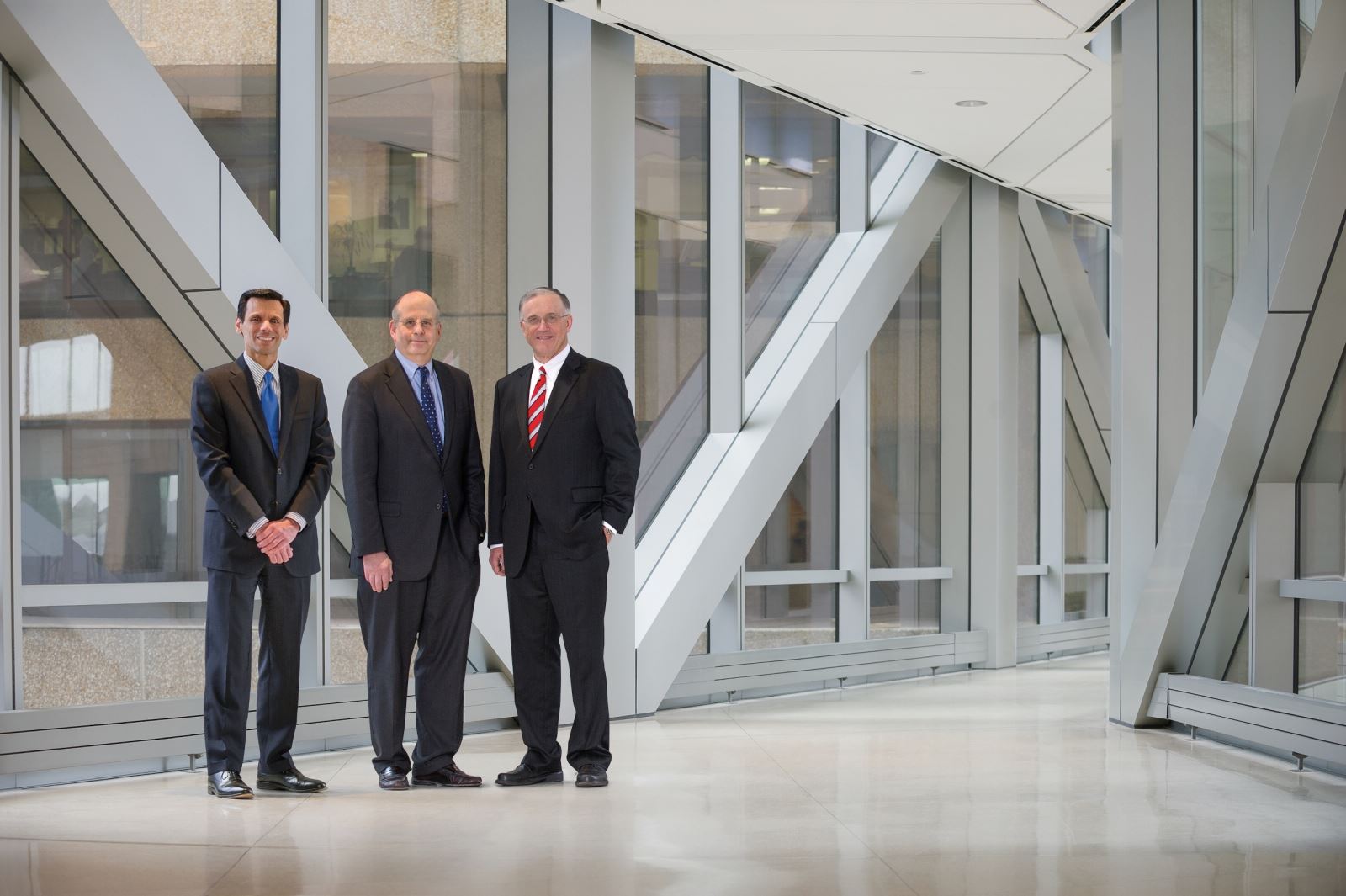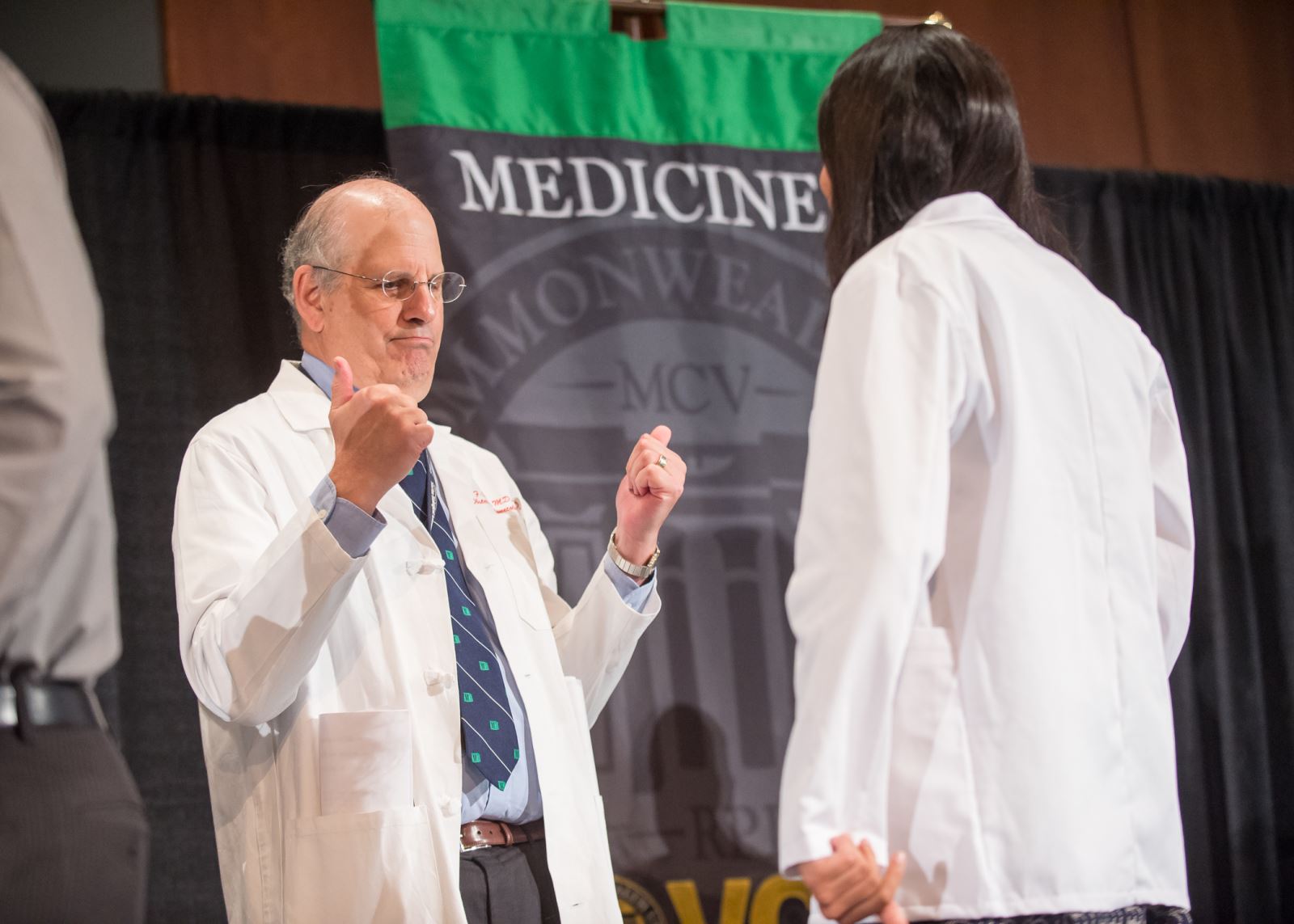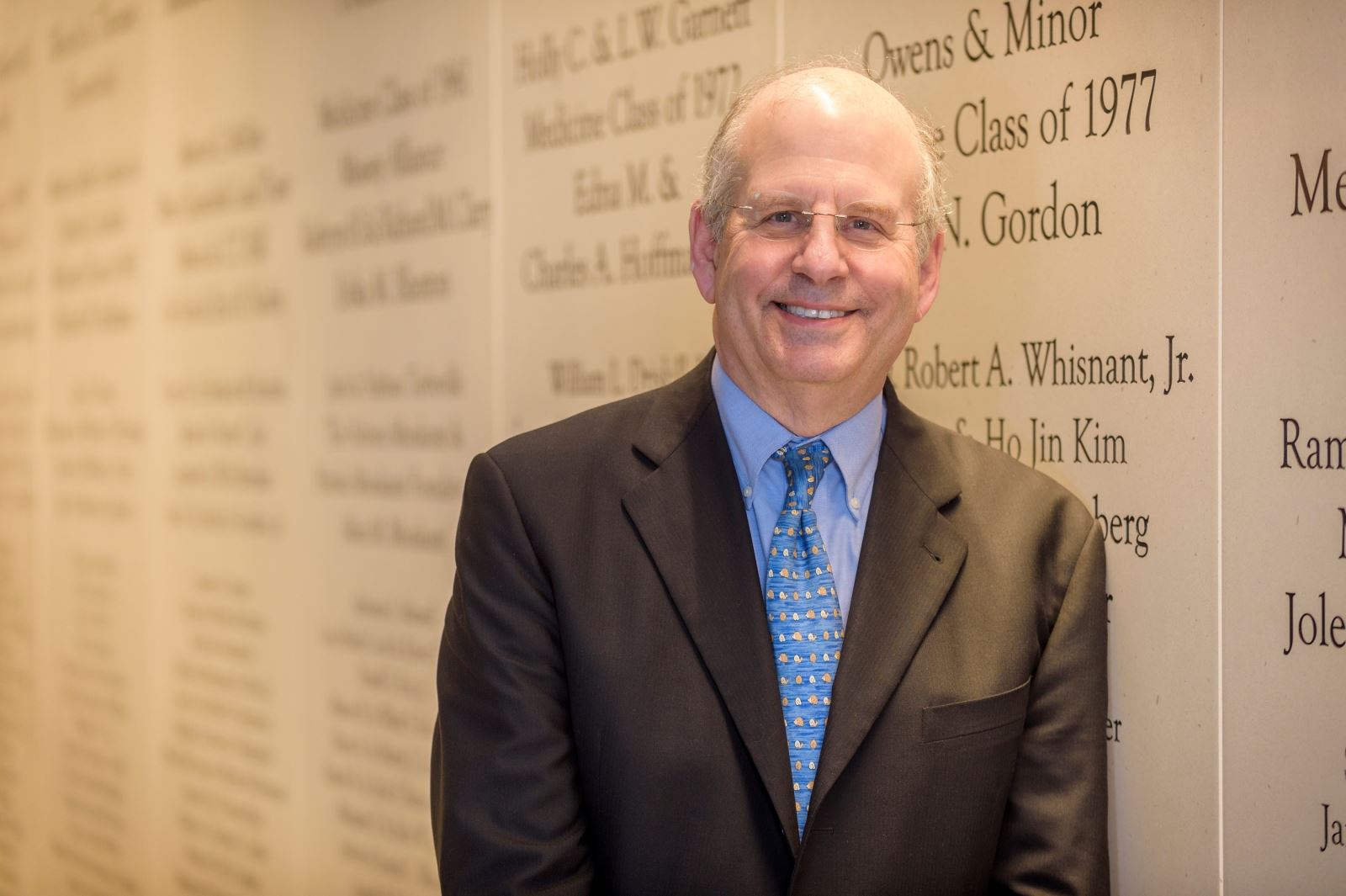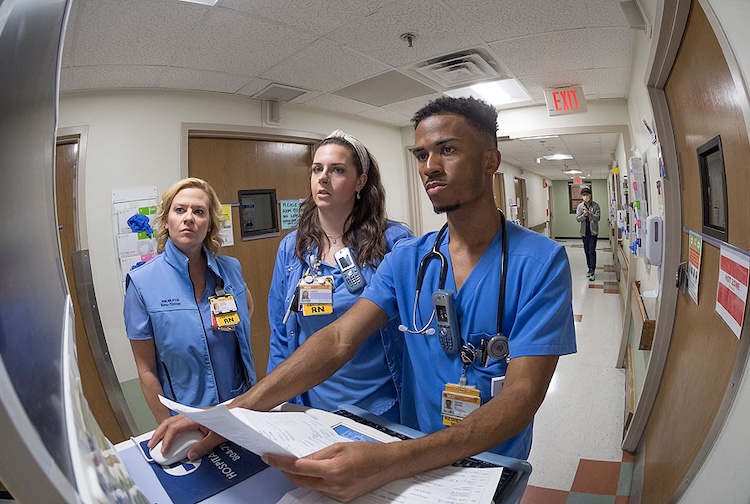The scientific method
February 21, 2017 Retired Dean Jerry Strauss took a scientific approach to improving VCU School of Medicine
Retired Dean Jerry Strauss took a scientific approach to improving VCU School of Medicine
Tuesday, Feb. 21, 2017
Jerry Strauss, M.D., Ph.D., describes himself as a child of the Sputnik Era.
The former Virginia Commonwealth University School of Medicine dean was 10 years old in October 1957 when Russia launched the first artificial Earth satellite into the atmosphere.
“It came as a huge shock to America that Russia had eclipsed the United States in terms of space exploration,” Strauss said. “It was a national wake-up call about improving the quality of science and technology in the United States. Science suddenly became a priority.”
Before Sputnik's launch, Strauss' budding interest in science had already begun, but he credits that fall day with setting the course for his eventual career as a physician, researcher and, later, the longest serving dean at VCU School of Medicine.
In his 11-year tenure as dean, Strauss oversaw a record-breaking expansion of the school's sponsored research portfolio, hired approximately two-thirds of the school's current department chairs, expanded infrastructure with new construction on campus and throughout the region, and much more.
In January, Strauss retired from his position as dean and returned to the school's faculty. While Strauss' workplace has moved from the dean's office to a laboratory space in Sanger Hall, the impact he made on the school as dean will resonate for years to come.
“The legacy Jerry leaves is incredibly beneficial for the school, the students and the people whose lives will be positively impacted by his work,” said VCU President Michael Rao, Ph.D. “I am grateful for his ability to insist on the best from his students and faculty, and we are humbled by his dedication.”

Experimental education
When he was 12 years old, Strauss blew up the porcelain sink in the basement of his downtown Chicago apartment while conducting an after-school science experiment with friends.
“I was adventurous with science,” he said. “It always fascinated me.”
The third-generation physician was inspired to pursue a career in medicine after seeing how personally rewarding it was for his father, who practiced as an internist in Chicago, and his grandfather, who was an otolaryngologist.
“My father enjoyed what he did so much that he never retired,” Strauss said.
In high school, he took his homegrown science experiments to the lab, working in research laboratories around the city during summer breaks. He followed his love of science to Brown University, where he majored in biology.
Strauss also was drawn to archeology. He had plans to work at an excavation site near the Golan Heights in the summer of 1967 between his freshman and sophomore years of college, but the start of the Six Day War abruptly cancelled the trip.
“I had tickets to fly to Israel and no place to work,” Strauss said.
At a mentor's suggestion, he applied to a summer internship at the Weizmann Institute of Science, a decision that ended up shaping the trajectory of his scientific career.
At the Weizmann Institute, a public research university in Southern Israel, Strauss worked in the Department of Biodynamics doing research in family planning and endocrinology. He enjoyed the experience so much that he returned to the Weizmann Institute for his junior year of college, taking graduate-level classes in biochemistry and biophysics and working in a reproductive endocrinology research laboratory.
“They treated me like a graduate student,” he said. “I made mistakes like all graduate students do and figured out how to resolve issues.”
By the time he returned to Brown during his senior year, Strauss had authored four academic journal articles and had an extensive knowledge base for someone of his age and experience. He credits his success at the Weizmann Institute to the generosity of numerous mentors.
“I was fortunate that there were people willing to invest time and effort in me,” Strauss said.
The experience had a profound influence on tangible and intangible aspects of his future. Reproductive endocrinology became a lifelong research focus and mentorship became an essential element of his career.
After graduating from Brown, Strauss joined one of the country's first National Institutes of Health-funded M.D.-Ph.D. programs at the University of Pennsylvania School of Medicine. “The goal was to train physicians to do clinically relevant research,” he said.
His interest in developmental biology and endocrinology led him to post-graduate medical training in the school's Department of Obstetrics and Gynecology.
“My motivation for medicine was from a scientific perspective of wanting to improve wellbeing through advances in research and its application to patient care,” he said.
Strauss went on to join the Penn faculty as a professor of obstetrics and gynecology, and began researching treatments and preventions for infertility. At Penn, he served as founding director of the Center for Research on Reproduction and Women's Health, associate chair of the Department of Obstetrics and Gynecology, program director of the Medical Scientist Training Program, and associate dean of the medical school. He worked there for 30 years before retiring and joining VCU in 2005 at age 58.
Collaborative efforts
In January 2005, Sheldon Retchin, M.D., met with then-VCU President Eugene Trani, Ph.D., to share his proposal for a bold new strategic plan for VCU School of Medicine that would dramatically increase the research portfolio of the school and university. The plan had an ambitious agenda — a six-year, $327 million initiative that included recruitment of about 100 research faculty members and construction of new laboratory and education spaces.
“I told Dr. Trani I would utilize the plan to recruit a stellar clinician-scientist as the next School of Medicine Dean,” said Retchin, who served as senior vice president of VCU Health Sciences and CEO of VCU Health System from 2003 to 2015.
Trani supported Retchin's plan and in February 2005 the VCU Board of Visitors approved it. “I leveraged the plan to recruit a dean who could build the school's research portfolio,” Retchin said. “When I met Jerry, I knew he was exactly what VCU needed.”
When he arrived at VCU, Strauss' No. 1 mandate was to enhance the medical school's research enterprise.
“It wasn't going to be an easy gig because the federal research and development budget had plateaued and was beginning to decline,” Strauss said. “The challenge was to encourage research and raise the university's profile to help advance the school's academic productivity in an environment where many academic medical centers were beginning to contract.”
He started by meeting with Retchin and John Duval, former CEO of VCU Hospitals and Clinics and vice president for clinical affairs, to devise an integrated plan that would advance the goals of the health system and the university.
“Jerry developed an academic plan to grow the medical school's faculty, which harmonized with the major strategic directions of the plan we crafted for the health system,” Duval said. “We created a unified approach to hiring faculty that was accretive to the clinical goals of the organization.”
The three determined that the first step would be to upgrade the school's research facilities and construct state-of-the-art buildings that would help support high-quality research. The new facilities would attract new faculty, who would contribute to research enterprises at the school and help establish research-based clinical programs that would ultimately benefit the institution's reputation.
As dean, Strauss oversaw the opening of the Molecular Medicine Research Building in 2009 and the James W. and Frances G. McGlothlin Medical Education Center in 2013. The eight-story, 125,000-square-foot Molecular Medicine Research Building houses 48 principal investigators and their staffs. The 12-story, 200,000-square-foot McGlothlin Medical Education Center houses a transformed curriculum and a simulation center that trains students, residents, faculty and staff in clinical skills and safety initiatives. The opening of McGlothlin also allowed for individual class enrollment to increase, with the medical school now accepting 216 students annually, up from 184 students a year when Strauss arrived at VCU.
“We placed emphasis on bricks and mortar because that is necessary in the recruitment of high-quality faculty and in enabling those people to be productive,” Strauss said. During his tenure, he hired 20 department chairs at VCU School of Medicine. “Department chairs play an essential role in the fabric of the School of Medicine and the health system,” he said. “They are the experts in their respective disciplines. They cultivate talent and help support programmatic growth in research and clinical care.”

Fostering high-quality research
A few months after the McGlothlin Medical Education Center opened, Charles V. Clevenger, M.D., Ph.D., came to VCU from Northwestern University, where he had served as professor of cancer research and leader of the women's cancer research program. The internationally recognized breast cancer researcher was appointed VCU's Carolyn Wingate Hyde Endowed Chair in Cancer Research and Chair of VCU School of Medicine's Department of Pathology in July 2013.
Clevenger credits Strauss with his decision to move to Richmond.
“Jerry described his vision for the department and gave me a sense that there would be opportunities to build and grow,” Clevenger said. Strauss had served as an informal mentor to Clevenger at the University of Pennsylvania when Clevenger studied and worked as a resident and later as faculty.
As chair of the pathology department at VCU, Clevenger has recruited four breast cancer investigators and 10 faculty members. In addition to improving the research capabilities of the school through recruitment of high-quality clinical investigators, Clevenger says Strauss' commitment to continuously upgrade facilities helped improve the research arm of his department. His laboratory on the fourth floor of Sanger Hall recently underwent a renovation.
“It will perhaps be the nicest laboratory space in the university,” Clevenger said. “Jerry had a vision of improving all aspects of the medical center. He gave me the resources and the capabilities to bring new faculty on board by providing me with the research positions and the space to do it.”
“I do not believe there is another dean in the country who has had a more significant impact on a medical school than Jerry's influence at VCU”
The commitment to improving facilities and hiring high-quality researchers has paid off. VCU closed the 2016 fiscal year at a record institutional high of $271.1 million in sponsored research funding, marking the eighth time in the past 10 years that VCU's researchers have taken the institution to record levels of external funding. The School of Medicine received $138.2 million in research awards in 2016, the highest amount for any VCU School. Additionally, under Strauss' leadership, VCU has been ranked for five consecutive years by the National Science Foundation as a top 100 research university based on federal research expenditures.
“Jerry over-delivered and was able to increase the research portfolio much more than we had anticipated from the original plan,” Retchin said. “He is an amazing recruiter and program builder. I do not believe there is another dean in the country who has had a more significant impact on a medical school than Jerry's influence at VCU.”
Modernized modules
The opening of McGlothlin in 2013 also coincided with the launch of a new medical school curriculum that Strauss spearheaded.
“We designed McGlothlin for the new curriculum,” said Susan DiGiovanni, M.D., interim senior associate dean for medical education and student affairs at VCU School of Medicine. DiGiovanni worked with Strauss in planning and implementing the new curriculum. “Very few schools have the luxury of designing their medical education building around their curriculum. Without Jerry's leadership, we would not have had that opportunity.”
The curriculum that started in 2013 was planned with input from a committee of more than 200 faculty and students from the School of Medicine. It focuses on team-based learning, individual problem-based learning and simulation.
Students are included in medical school decisions through involvement in committees. “It is important to Jerry that our students have a fabulous education, but also that they feel like they are part of the health care team,” DiGiovanni said. “He makes everybody feel important, whether they are faculty, administration or student.”

In May, the first class to start with the new curriculum will graduate.
“I love that the new curriculum allows us to get into the hospital sooner,” said Perrin Downing, who will graduate from VCU School of Medicine in May. “VCU trains us clinically exceptionally well.”
As Medical Student Government secretary and co-vice president of her class, Downing has worked with Strauss throughout her years at VCU.
“Dr. Strauss is supportive of us as medical students,” she said. “I find him to be very approachable.”
A commitment to mentorship
Soon after arriving in Richmond from Argentina, Maria Teves emailed Strauss to inquire about collaborating with him on reproductive endocrinology research. Teves had completed her Ph.D. in biology at the National University of Cordoba and moved to Richmond in March 2010 when her husband got a job at VCU.
“I didn't know he was the dean of the school,” Teves said. “I was just aware of his research.”
Strauss replied immediately and within a few months, Teves had a job working as a postdoctoral researcher at his lab. Through her work researching male infertility, Teves communicated with Strauss on a daily basis and met with him at least once a week. In May 2015, she was first author on a PLOS ONE journal article that for the first time in scientific history explained the association between human height and a specific protein-coding gene found in sperm.
“Dr. Strauss is a great mentor,” Teves said. “He always encourages me to try new things and whenever I run into problems with experiments, he is there to guide me toward solving the issue.”
In March 2016, Strauss was honored with the Frederick Naftolin Award for Mentorship, presented by the Society for Reproductive Investigation. The award recognizes the contributions of a society member to the training and career development of investigators in the field of reproductive and women's health.
“I view mentorship as one of my daily responsibilities,” Strauss said. “It wasn't just during working hours. It was also on weekends and evenings. Often, weekends were the best time to work in the lab.”
Teves said in addition to providing mentorship for her research, Strauss is extremely dedicated to furthering his research expertise as well.
“He is always here on weekends and holidays,” Teves said. “He is a very hardworking person.”
The Strauss Era
In January, Strauss returned to his original love of research and mentorship. The 69-year-old scientist maintains an active laboratory on the 11th floor of Sanger Hall, where he studies developmental biology and endocrinology.
During his research career, Strauss has identified metabolic disease-causing genes and developed methodological approaches for studying certain cell types that had not previously been conceptualized. Recently, he was involved in the elucidation of disease mechanism for a common cause of infertility and metabolic disturbances.
Strauss has authored more than 300 original scientific articles and holds 12 issued U.S. patents for discoveries in diagnostics and therapeutics. He is senior editor of Yen and Jaffe's “Reproductive Endocrinology,” which is the major textbook in the field of reproductive medicine. He was elected to membership in the Institute of Medicine (now called the National Academy of Medicine) of the National Academies of Science at the age of 47, and chaired two committees that issued reports on contraceptive development and the state of ovarian cancer research. Strauss also served as a member of the Discovery Expert Group for the Bill and Melinda Gates Foundation, and chaired the Board of Scientific Counselors of the NIH's National Institute of Child Health and Human Development.
“My motivation for pursuing medicine has come from an interest in science and research,” Strauss said. “There is an element of creativity in science that is very rewarding. I have always viewed science as an art form.”
To those who have known him and his work, Strauss' roots in a commitment to scientific discovery has resulted in innumerable benefits to the university. A scientist by training, Strauss took an evidence-based, inquisitive approach to his tenure as dean, ultimately leading to unprecedented achievements for VCU.
“An academic health center cannot be successful without realizing its full potential as an engine of research and discovery,” Retchin said. “Jerry is a basic scientist by training, and yet his ability to focus on translational discoveries is astonishing. Years from now, VCU will refer to the Strauss Era as a period of visionary growth.”



.jpg)

